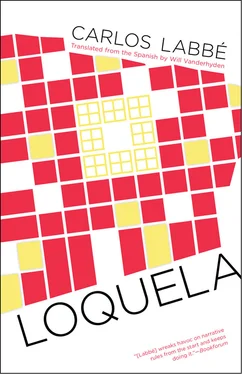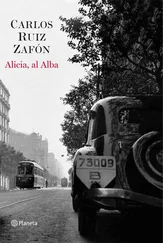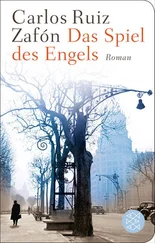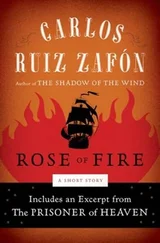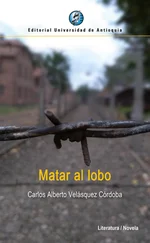What terrifies me is that if you don’t come to take me, I’ll have to go alone, that if that happens this letter will be my last useless act. I move through the house like a thirsty animal that stumbles while carrying cups of water and spills them; the water runs across the parquet floor and is nevertheless absorbed by a dry earth that calls to me. This is vengeance. When finally you enter Neutria, when you are living there and you don’t know just what it is that bothers you in that longed-for place, it will be me. In the names of the streets, in the letter you receive, in the darkness of your bedroom my remnants will resound. But I must speak quick and clear, because in my grandmother’s trunk I’ve only discovered fifteen old sheets, like fifteen opportunities to remain blank, yellowing, ancient, that are wasted once covered with ink.
You and those identical to you who make up the Corporalist group had delineated a plan that would end with your disappearance, like what happened to The Young Poet. According to the plan that you’d written in your novel you were going to submit yourself, step-by-step, to various humiliations, wrapping pages of Canto General around rocks and throwing them through the windows of the Neutrian Writers’ Society. You’d be detained, taken away, and, while being tortured, recite paragraphs from Walt Whitman. The professor would get you out so that by the afternoon you’d already be covering the walls of the Neutria municipal theater with cheap professions from Corporalization Manifesto ; the next day that supposedly secret text was reproduced in all the newspapers alongside a photo of you tattooing a Marinetti verse across your whole chest. You screamed in pain in downtown Neutria, because you’d cut your arms with razor blades, smearing shop windows with blood — that’s what the novel ordered you to do that day — and you were arrested again for disturbing the peace. In jail you were raped by four prisoners, because you punched one of them when he laughed at you; you said nothing, you did not waver at all when confronted with the demands of each phase of the plan: bottles broken over your head during a fight in a Lárico poets’ bar, twenty-one days drinking only wine, bathing naked in the fountain in the Plaza de Armas wearing nothing but a heavy mask of Enrique Lihn. How you let a little boy who assaulted you on a corner of the most dangerous shantytown in the port stab you, the tears on your face as he buried the blade in your shoulder. You were accused so many times of inciting violence, at the stadium you went into the bar wearing the rival jersey, whistling every time of one of the local strikers got near the goal. They accused you of being deranged, of being an imbecile, they said you were a mental patient: on TV a senator offered to have you interned at an asylum on his dime; a journalist used you as an example of compromise and rebellion in a magazine, later you spit on his hands in a press conference. You regretted none of it, because each one of your misdeeds were systematically announced in your paragraphs, and a boy just like you was following you everywhere to write down a detailed chronicle of your actions in his notebook, another novel that would be the register of the long, sweaty workdays of Corporalism. One hand on my waist, the other on a recording device, the third scratching a wall, and the fourth writing the novel of the novel; in this way we passed the time together, because when He Who Is Writing the Novel ceased to appear, the movement would end, so it was possible to read the manifesto in your notes: the written register of your body’s transition — from a clean and fresh body, to a filthy, wrinkled body, torn to its furthest reaches by hairs, scars, hematomas, scratches, marks, irritations, encrusted metals, bleedings, pusses, and gangrenes — was proof that body and literature are incomplete words; how then to speak of the soul, of permanence? I was watching how you doused yourself with gasoline, lit a match, wrote something down about the man in flames, asking me how I could love you, what the name of this thing that united us was, what place you occupied in the painting of Neutria that I was finally describing in my pages. Then you took my hand and told me to be calm, that in the novel a woman appeared walking on the beach, looking somberly at the sea, and it was me — little because you saw me from far away — the albino girl, who would carry out a culminating role in the History of Corporalism.
As if at the same time we were somewhere else, He Who Is Writing the Novel accompanied me every morning to the beach. We walked across the sand holding hands, we stopped to kiss each other, we fell down together and then I had to get up, to keep going, while He Who Is Writing the Novel stayed on the sand, watching me. Sometimes I thought I noticed that a man just like him was filming us from a distance while we rolled around together, and simultaneously I kept walking toward the sea with my notebook, while at my side you asked me why we weren’t going to my apartment. I held your hand in silence, how insistent you were. Sitting in the sand I dedicated myself to the painting of the beach of Neutria; the rolling wave in its coming and going, frustrated by the tide that rose as the sun shifted position in the sky, the water insisted on continuing to be the word water, it made me want to throw my notebook as far as I could to see how the sea sank any attempt to immobilize it, and I kicked you, and shouted: imbecile, can’t you see I want permanence, and you just the opposite, you want disappearance. You’re going to kill me. You laughed at my cries while napping on the sand; you hadn’t slept much that week because you stayed up every night writing the novel. But that was impossible, we members of Corporalism knew that after He Who Is Writing the Novel marked the final period nobody would be able to change even a comma of the plan. Right then you confessed that you were going to change the novel’s ending, that every night you reread the chapters so that it wasn’t the protagonist who died, while during the day you kept on pretending that your body was irredeemably destroying itself. Another wave broke, a boy built a sand castle near where we held each other. During the day you tried to rape a schoolgirl in some Neutrian plaza, in full view of everyone so that they’d lynch you, yet at night you make corrections: as he was spreading the girl’s legs he saw in her face the woman he loved. The scream was her scream, the pain was her pain. So night after night, chapter after chapter, Corporalism passed from a manifesto about death to a love story, you told me, and without writing anything new, every night you asked the same question: how to tell the untellable. I embraced you, happy: from a love story to a novel about the salvation of a character. I always forgave your pretentiousness. I loved you so much. And we stayed there, lying on the sand, holding each other. The waves retreated, the sun set, you left, I stayed there describing how the tide went out in my picture. The lighthouse of Neutria was already lit. Suddenly someone identical to you sat down next to me and took my hand in the darkness. He Who Is Writing the Novel squeezed my fingers forcefully, he kissed me all over and even bit me, and in the end he threatened me so I’d stop writing Corporalism in my way: I am just a useful narrator here, and if the character takes the novel too far, the author might find himself forced to make her die.
In the darkness of the beach, I seemed to also see that a pale girl was attentively watching me and He Who Is Writing the Novel — the couple that we formed for a second, holding hands, while he threatened me — observing us and taking notes; a girl like me, who went to my spot, who walked the streets of Neutria with me, who arrived at the entrance to my building, went up in the elevator, took out the key, entered my room, felt the need to take off her clothes, went to the bathroom, splashed water on her face and albino hair. In the dining room she found a note from her friend Alicia that said: I’m sick of this place, I’m going back to Santiago. The girl put her clothes back on, and took a taxi to the Neutria bus station. On the way she noticed that the streetlamps were falling from their posts, cars were entering a nonexistent roundabout, people were going into unnumbered houses, kids on bicycles in the plaza were turning where there wasn’t a corner, the trees were growing, dense, becoming a forest, exuberant vegetation untouched by human beings. Instead of a city there appeared a small village, then a military stronghold, four Spaniards dismounting and building a fire on which to cook, three natives chasing two animals leaving an egg hidden in a cave that is nothing but dry earth, dust, gas, emptiness.
Читать дальше
